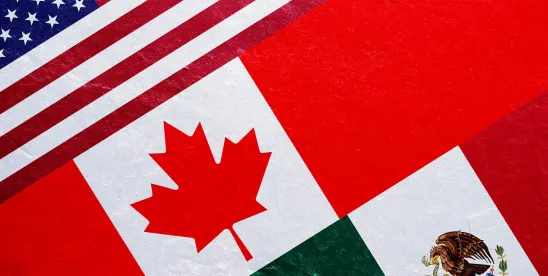The United States-Mexico-Canada Agreement (USMCA) replaced the North American Free Trade Agreement (NAFTA) and came into effect on July 1, 2020. To ensure compliance with USMCA, businesses engaged in trade within North America should be aware of the following key requirements:
- Ensure You Have Properly Determined the Country of Origin: USMCA includes updated rules of origin criteria, specifying the minimum regional content and other requirements that goods must meet to qualify for preferential tariff treatment. You should ensure that your company is applying the correct country of origin rules for trade with Canada and Mexico, as the normal substantial transformation test that is usually applied by Customs does not apply within the USMCA region. You should ensure your imports meet the applicable rules of origin to claim preferential tariff rates under USMCA.
- Evaluate Whether You are Meeting Regional Content and Labor Content Requirements: In addition to replacing the normal substantial transformation rules with largely a tariff-shift analysis, USMCA added special regional content and labor content rules for certain types of goods. You should ensure that your country-of-origin determinations properly apply all of the USMCA requirements beyond the normal tariff shift rules.
- Review Whether You Have Updated Certificates of Origin Consistently Available at the Time of Importation: FTAs, including USMCA, often impose a requirement to have certificates of origin for anticipated duty preference claims. If these certificates of origin are not in hand at the time of entry, then the entry is not eligible for duty preference, even if the rules of the FTA otherwise are met. You should review your certificates of origin to ensure your company had all required documents on hand at the time of importation.
- Ensure You Are Meeting USMCA Recordkeeping Requirements: Customs regulations in general impose a recordkeeping obligation, as most documentation relating to the information required on the 7501 Entry Summary Form is supposed to be on hand. USMCA imposes additional obligations on importers, exporters, and producers to maintain records relating to the origin of goods, including documentation supporting the certification of origin and the retention of all certificates of origin. You should ensure that such requirements are reflected within your Customs compliance policy or your Record Information Management schedule of destruction.
- Confirm You Are Not Subject to Import Requirements Aimed at China: An additional complication regarding the importation of goods from Mexico arises because of the common use of Chinese parts and components in Mexico. One complication of doing so is that the applicability of the Section 301 tariffs (unlike normal Chapter 1–97 tariffs) is determined using the normal substantial transformation test, which means the country of origin for determining whether Section 301 duties need to be paid can differ from how the product needs to be marked and whether originating status can be claimed for Chapter 1–97 duties. In addition, the use of Chinese parts and components can raise issues under the Uyghur Forced Labor Prevention Act (UFLPA) if the inputs originate in the Xinjiang region or from companies on the UFLPA Entity List.




 />i
/>i
